#and how heavily influenced it is by my own experiences with brain injury and ptsd
Text
personal writing under cut
When I was a kid, I was playing with one of my friends, a girl named Hailey, when I was hit in the head very hard and knocked unconscious. When I woke up over an hour later, I was asked my name.
I told them my name was Hailey.
When they asked me what I'd been doing before the accident, I told them I was coming home from school--they asked me what school, and I clarified Hailey's school. When they asked me who the people sitting next to me were, I said they were Az's parents.
It seems like I have always struggled with memory. It was difficult for me as a child to distinguish between accounts of other peoples lived experiences and my own--which felt, and often feel, even as I create new ones, like they are stories told to me by a treasured friend. To this day, I will occasionally bring up someone else's childhood event as if it were my own and receive confusion in response.
Or I'll forget major events, major characters in my own life. Sometimes I can feel it as it slips away, leaving a hole, and I have no way of knowing what was there before.
Hailey and I fell off as friends when her family moved away, but we reconnected over a decade later when we both enrolled at the same college for undergrad.
When we met again, for the first time in over 10 years, the first thing that struck me was just how different we were. She was a vivacious, bubbly, Christian girl that made friends easily and wanted to be a music teacher. She seemed, every inch, like the adult version of that little girl that hit her head.
I, on the other hand, was a shell-shocked queer teen with PTSD that just wanted to survive, and maybe write a couple decent stories along the way. There was no trace left of the me that she used to know.
We had nothing in common--no hobbies, no ideologies, no interests. I wished her well, but I haven't spoken to her since. I have my own life now, with a house, and a car, and a backyard by the river, and I'm happy with the progress I've made.
But sometimes, when I look on her social media page, and I see the pictures--what she's reading, the people she loves--I can't help but wonder if my brain stole her life, or if maybe, in some small way, she took mine.
#pb.txt#my writing#not rvb#ptsd#i was talking to my partner last night about trying to write The Wash Fic#and how heavily influenced it is by my own experiences with brain injury and ptsd#and i realized just how similar the writing is to my own lived experience#so i wanted to write it down somewhere#to be clear#i don't want her life#but it's really weird to see this person that has pretty much the exact life that was expected of me as a kid#anyways#my adventures in memory loss
0 notes
Text
Dimitri and mental illness
**Warnings for Blue Lions spoilers and armchair psychology
Depending on who you ask, Dimitri is an innocent sweetheart whose actions are entirely excusable and justified or an unforgivable war criminal and overall terrible character. Arguments for both sides have been exhausted, usually in the form of the popular Edelgard versus Dimitri debate, but I feel that both statements are heavily flawed and, truthfully, I think I take more issue with the former. Does it strike anyone else as rather patronizing that the audience (and the game, to an extent) treats Dimitri like an innocent, broken uwu soft boy both before the time skip and once he begins his recovery arc? Of course, a lot of this can be blamed on the awful pacing and poor writing of said recovery (which is the most valid structural critique of his character imo), but there’s a lot to be said about the fan depiction of Dimitri and the way people treat his mental illness. I think the reason this gets me is because I see it as an extension of the problems I have with the romanticization of male-specific mental illness. In this case, “all depressed boys are emasculated, soft, sad bois” and “anger is an accessory that is vanished once the cute boy takes it off” with the related sentiment of “the only two real mental illnesses are depression and anxiety, with a splash of PTSD for argument's sake”. And, speaking of arguments, while many people bring up mental illness in regards to the discussion around Three Houses characters, it is often supplementary to support their points rather than the main point unto itself. Dimitri’s mental illness (aka, the thing his entire arc is predicated upon) is mostly given only a passing recognition in the discussion of his actions. Even then, it’s often used as a justification to defend or lambaste him.
TL;DR Dimitri is a flawed person with a debilitating and incredibly well written mental illness that, while not excusing his actions, allows for further exploration of his character and a well-deserved shot at a recovery arc that is not usually awarded to people with the “non-traditional” mental illnesses. Furthermore, the game offers a wealth of insight as to what they intended his mental illness to be, the symptoms that manifested, and a plausible background to match up with it all and I have the receipts to prove it. Let’s go~
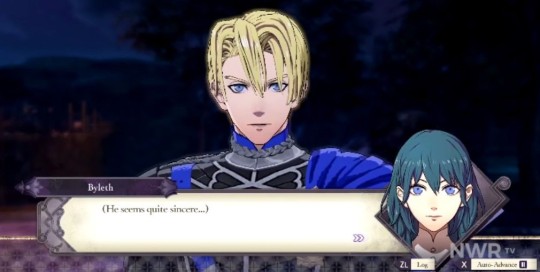
“Me? Oh. Um. Please forgive me... It's difficult to open up on the spot, don't you think? I'm afraid my story has not been a pleasant one... I do hope that doesn't color your view of me, but I understand if that can't be helped.”
I know that mental illness can be singularly caused by a traumatic event or events. That is, generally, how I see people framing Dimitri’s mental illness. My argument, however, is that the Tragedy of Duscur was not the genesis, but the trigger for issues that would exist otherwise. Perhaps it’s due to my own personal experience with mental illness, but I’m almost always more inclined to believe that issues stem from an unlucky combination of many things.
Regardless, my evidence to entertain the idea that he would be naturally predisposed to mental illness is slim. Aside from arguing that it wouldn’t be out of the question for his mother to have been unwell while she was pregnant with him considering she would later die of plague (a cause that in and of itself is subject to skepticism), I would bring up his Crest. In-game there is clear proof that Crests have wide-reaching effects on the person, there are actually a few analysis posts that hypothesize that Crests could be the reason for certain character motivations. In ng+, the Crest of Blaiddyd is called the Grim Dragon Sign. There’s no definitive proof to point to here, but if his Crest was one of the reasons for his mental deterioration it would follow other rules set in-game. Rather than inherited human genetics creating the blueprint for mental issues and the writers having to face that issue on its own terms, it was the Crest’s influence. This goes along with the fact that the game never overtly references Dimitri’s illness, essentially using “the dead” as a blanket symptom of his problems. Both these things are cool ways to imply a possible way to read more deeply without having to use anachronistic medical terms.
Side note: There’s something uncomfortable about the idea of a Crest that gives the individual inhuman strength and mental issues. Grim Dragon indeed.
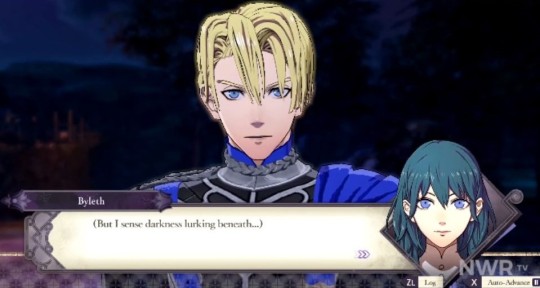
My next point is one that I don’t see being brought up too often in regards to how it might have affected Dimitri, likely because the events that came later in his life far overshadow it, but Dimitri lost his mom when he was young. The date is not given, but I think it’d be when he was about six-ish. Admittedly, the timeline is strange and non-specific around here but if that were true, it would mean that the plague, Dimitri’s mother’s death, and Lambert and Rodrigue’s war campaign to subjugate the southern half of Sreng would all have happened around the same time. Dimitri says he doesn’t remember it, but that doesn’t necessarily matter. At six years old he had lost one parent and the other one left him to go on a battle march, leaving this child without any sort of parent figure to console him in a country that is culturally opposed to expressing emotion. Lambert will probably always remain a mystery, but I think it could be fair to say he was a poor father. Or at the very least a distant one. Dimitri was undoubtedly a sensitive child (if we’re to judge by the sensitive person he grew up to be) and during the years where he was actually becoming old enough to remember, he had nobody to teach him how to properly navigate and manage his emotions. Emotional neglect in a child who is predisposed to being emotional and empathetic can leave them suffering from a sense of isolation, an inability to ask for help, and a predisposition to having break downs as they get older.
But three-ish years later, possibly one of the best things that ever would happen to Dimitri came to pass and Lambert married Patricia. Dimitri adored her.
“I share no blood with my stepmother, but to hear you say that... It pleases me greatly. She was the one who raised me. I suppose it makes sense that we would share certain mannerisms.” (Dimitri’s B support with Hapi)
I don’t think Dimitri’s feelings about Patricia can be overstated, as I feel it’s one of the most defining aspects of his reactions to things that happen later on. Dimitri talks about Patricia more lovingly than he talks about Lambert. She was in his life for around four to five years but had such an impact on him that even his mannerisms are similar.
Soon after, a ten-year-old Dimitri made his first friend that wasn’t knightly, who didn’t embody those Faerghus ideals of stifling emotions and swinging swords.

People point out the Faerghus crew as Dimitri’s best friends, and yet Edelgard is the one associated with his best memories. It’s just my own assumptions, but I think that it’s because both Edelgard and Patricia gave Dimitri space to be an emotional child, to not have to be the knightly prince who had no emotions and engaged only in the most masculine of activities. And, I mean, look at them. He’s learning to dance and she’s bossing him around, absolutely no regard for propriety.
It’s pretty clear that Dimitri doesn’t feel romantic feelings towards Edelgard in the academy phase, but I think it would be fair to say she was his first love when they were young. He essentially says this was the best year of his life and establishes Edelgard as someone very precious to him (as well as the daughter of one of the most precious people to him). Strong feelings beget strong feelings, do they not?
Google says that eleven to fourteen is the general age of male puberty. It’s the time that kids begin to more fully define how they’re going to emotionally interact with people and the world at large. Meeting Edelgard was at the cusp of this period of Dimitri’s life, and the Tragedy of Duscur was right in the midst of it.
And we all know what that turned out.
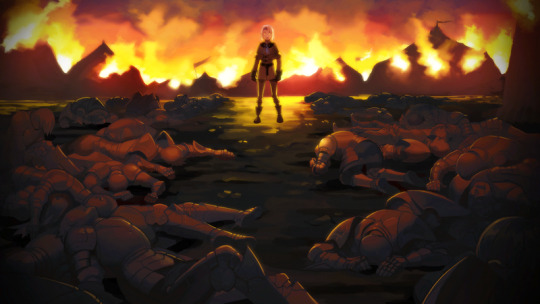
Dimitri’s accounts of what happened during the Tragedy are... conflicting. This CG of an unharmed Dimitri in a field of corpses is... conflicting.
“My father...was the strongest man I knew. Someone I loved and admired deeply. That said, he was killed before my eyes. His head severed clean off. My stepmother, the kindest person I had ever known, left me behind and disappeared into the infernal flames.”
I’ve seen people create a plausible scenario in which Dimitri’s recollection is entirely accurate, where he saw Lambert call for revenge and get beheaded, saw Glenn’s ruined body and face twisted in pain, saw his step-mother disappear into the flames, and all despite the raging chaos of the battle and how people would undoubtedly be targeting the prince, but I think it makes more sense that his memories are unreliable. Dimitri suffered a severe head injury (very important to keep in mind) at Duscur. Maybe that happened early on, after seeing who attacked Lambert but before he was an actual target himself, which merely made him look dead. Maybe he saw a version of the events he described, but through the filter of confused head trauma, smoke inhalation, and intense terror. To think that his recollection isn’t exactly entirely reliable sets a precedent for his later skewed take on reality.
Regardless of opinion, though, the facts are that Dimitri left Duscur with a traumatic brain injury and post-traumatic stress disorder.
After that, from thirteen to seventeen, Dimitri was pretty isolated. Most of the people he cared about were dead. His entire emotional support system (Patricia) was gone. He saved Dedue (although they were definitely not on even terms, that relationship is unbalanced to the extreme) and occasionally saw Rodrigue (who I have no reason to believe was emotionally accommodating in any way considering the way he sees Dimitri as an extension of Lambert to his dying breath). Again, it’s strange. People act like Dimitri was super close friends with the Faerghus crew, that he was surrounded by people who loved him (although it is clear there is a lot of love there), but he never presents things in a way to imply that’s the case. In fact, he highlights his isolation:
“In Duscur, I lost my father, stepmother, and closest friends. I didn't have many allies at the castle after that. In truth, I had only Dedue for companionship.”... “I once had people I could confide in. Family, friends, instructors, even the royal soldiers. But they were all taken away from me four years ago.” (Dimitri’s C support with Byleth.)
Two years passed before the next time Dimitri saw his friends and it was a war campaign, putting down the rebellion in western Faerghus. Dimitri speaks about those battles from a place of deeply affected emotion, expressing empathy, pain, and disgust with his actions and the killing.
“I recall coming across a dead soldier's body. He was clutching a locket. Inside was a lock of golden hair. I don't know to whom it belonged. His wife, his daughter...mother, lover... I'll never know.... in that moment, I realized he was also a real person, just like the rest of us… Killing is part of the job, but even so... There are times when I'm chilled to the bone by the depravity of my own actions.” (Dimitri’s B Support with Byleth)
I love this support, honestly. It’s so very telling about the destructive quality of empathy. Although caring can be a good thing, it’s also arguably one of the most destructive of Dimitri’s qualities. His empathy is what presents him with situations he cannot accept, the thing that pushes him to disassociate from reality so he can be rid of it and fight without remorse like he was taught to do by his father and other soldiers. Dimitri is a man of extremes. Either total control or none, without any room for error. This dialogue is also the first time Dimitri brings up reconciling himself with reality and hints to the fact that he has been unable to do so. This is contrasted perfectly in this line from Felix,
“The way you suppressed that rebellion... It was ruthless slaughter and you loved every second. I remember the way you killed your victims. How you watched them suffer. And your face...that expression. All the world's evil packed into it...” (Dimitri’s C Support with Felix)
Dimitri doesn’t deny this. Just like all of the other terrible things Felix says, he takes it without protesting in an act of what I think is stilted contrition. Although, it’s not just in supports that Dimitri’s contrasting behavior is brought up. The Remire incident probably works as a good reference for what Felix saw all those years back.

This is the first time we see Dimitri’s darker side in full. The similarities in the situation to what is shown to have happened in the Tragedy of Duscur are interesting. The fire, the utter chaos, strange figures watching it all from above. This is another case of a perfect disaster. I wonder if his ultimate snap would have been so destructive if not for Remire.
Anyway, this draws parallels to his and Felix’s separate recall of the rebellion because later Dimitri apologizes.
“Professor... I...I'm sorry you saw that side of me in the village… When I saw the chaos and violence there...my mind just went completely dark.”
Dimitri is unreliable. A lack of control, a separation of self, and becoming consumed by a dark rage only to come to his senses later, full of shame and a sense of confusion about why. From my own experience, it’s not unnatural to come out of an episode like this without being able to explain what was happening and being baffled by your behavior. This firmly establishes Dimitri’s uncomfortably fast mood shifts in relation to his trauma from the Tragedy and confirms all of the warnings Felix had given. When Dimitri was faced with a reality he could not accept, he lost control of his emotions and his mental state shifted to adapt accordingly.
This is when I’d also like to note something interesting about how Dimitri discusses his trauma. He is very honest and open about his experiences, explaining exactly what happened to him to Byleth. However, he uses the truth to hide. In recounting the events of the Tragedy of Duscur, in talking about how his family died and saying how badly it hurt him, he does not make himself vulnerable. When he admits weakness, he does so in the past tense or apologetically, vowing to be stronger. “Stronger”, aka, he’ll be better in suppressing his emotions.
“I always strive to keep my emotions at bay, but... Sometimes the darkness takes hold and...it's impossible to suppress. It just shows you how lacking I am... I have much to learn.”
Dimitri lies by using the truth, shoving down his feelings, and blaming himself rather than attempting to figure out how to handle his emotions. In his own words:
“Everyone has something that is unacceptable within them. I certainly do, and I'd wager you do as well. I wonder which is best, Professor... To cut away that which is unacceptable, or to find a way to accept it anyway...”
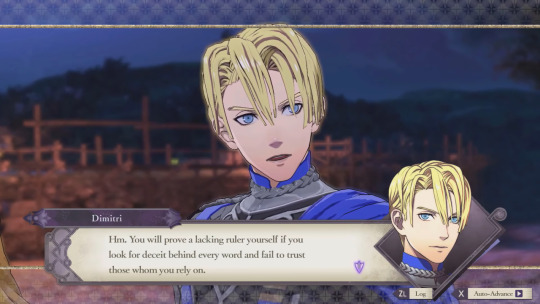
Good advice Dimitri. Might want to keep that in mind.
It is at this point is when I’m going to get into my personal thoughts and armchair psychiatry nonsense.
First off, when I mentioned earlier about “non-traditional” mental illness, I did not mean abnormal or rare. Although people mostly just point to Dimitri having PTSD (and depression) as the source of his issues, I’m going to use all of my above information to make the (decently common) argument that Dimitri is schizophrenic, which is, contrary to popular belief, not too unusual. I state that with the caveat that I understand that there’s a lot to be said about schizophrenia and the tumultuous relationship between mental health and fiction. However, now is not really the time to go into mental health politics and representation or the many lies spread about the illness so instead, I recommend that you read into the topic if you’re personally interested (This has some good information).
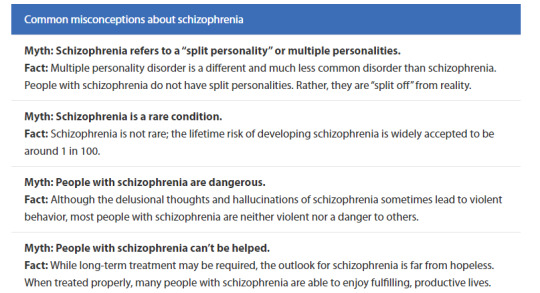
At the very least be aware that this IS sensationalized.
That said, Dimitri does not, to my understanding using grossly simplified terms, meet the qualifications generally (very generally) used to diagnose schizophrenia through the majority of the White Clouds chapters. These qualifying symptoms include, but are not limited to, the duration of the psychotic episode, the concurrent presence of hallucinations and delusions, and a greatly lowered ability to keep up with basic quality-of-life tasks. You only see these symptoms in the final chapter of White Clouds and the first few of Azure Moon. This isn’t unusual, however, because schizophrenia manifesting fully in younger individuals is extremely uncommon, sometimes taking years to trigger during a person’s late teens. And since the diagnosis generally relies on the occurrence of a psychotic episode, it can be mistaken as other mood disorders. Actually, the idea of him having a mood disorder was one of the things that caught my eye originally. Prodromal symptoms such as depression, irritability, headaches, sleep disruption, and mood swings are common in bipolar disorder (and, of course, schizophrenia).
Still, I don't deny that Dimitri has PTSD and depression, only that I don’t think PTSD is his main (or only) issue. In reality, PTSD and schizophrenia are closely tied. They share many symptoms, even the symptom of psychosis. There’s also evidence that those with genetic precedent to develop PTSD overlap with those at risk for schizophrenia, and that the nature of PTSD triggers can act as a severe stressor to aggravate a schizophrenic episode.
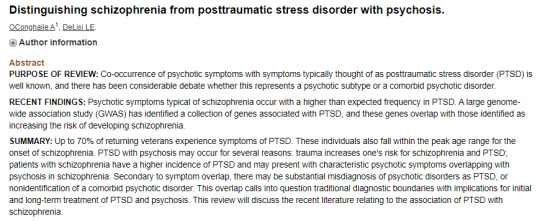
(From here)
This falls into the realm of being uncertain where one ends the other begins, highlighting the lack of concrete understanding about schizophrenia and the dependency of diagnosis and treatment to rely entirely on the individual experience, but that’s not a conversation I’m actually qualified to have.
The study that truly caught my eye and while researching for this was one called “Psychiatric disorders and traumatic brain injury”. As I mentioned, at some point during the Tragedy, Dimitri sustained severe head trauma. We know this because of his development of the rare inability to taste called ageusia. I was originally interested in following this narrative thread because, as you might know if you follow true crime cases, there are many murderers who recall having sustained a head injury as children. Not that Dimitri shares similar psychology to people that kill and eat their victim's feet... Although his body count is higher. Besides that, head trauma, in general, is known to be linked to mental illness and altering a person’s behavior. There is even a correlation between TBI (traumatic brain injury) and schizophrenia.
From the study I linked above:

To put it more simply, patients in the study who had suffered TBI and developed schizophrenia reported that their most common symptoms were delusions of persecution, auditory hallucinations, and aggressive behaviors. The auditory hallucinations were often voices. Many of the subjects experienced psychotic episodes two or more years after the initial incident (although, as I mentioned, Dimitri’s age could also have something to do with the timing as children rarely have fully developed schizophrenic episodes). Furthermore, the behaviors classified as an absence of normal behaviors called “negative symptoms” (which include apathy and disordered speech) were rare in this testing group.
Dimitri exclusively displays “positive” symptoms of schizophrenia (“positive” meaning the presence of symptoms such as hallucinations and delusions). He also clearly suffers from delusions of persecution in his belief that Edelgard is the sole instigator of Duscur and the war and that he immediately accuses Byleth of being an Imperial spy upon meeting them post time skip. I think it’s pretty fascinating how closely Dimitri’s symptoms follow the outline of the study, especially with the aggressive behaviors, as those aren’t actually very common in schizophrenics.
In very, very simplistic terms, if I’m right and Dimitri was born with the genetic blueprint for schizophrenia/PTSD (through Crests, inheritance, or environmental causes) and later suffered severe head trauma in an event that also gave him PTSD in combination with his pre-existing parental issues and stilted emotional development, then this could definitely create the type of person who loses all sense of reality, can’t control his emotions, and is prone to episodes of murderous rage when being reminded of the trigger (however tangentially) of losing everything he loved.
However, I’ll add real quick that the study I mentioned should be taken with a grain of salt.

I use it mainly because I thought the similarities were interesting and it shows that there was more thought put into Dimitri than maybe people appreciate.
This brings us to my final point; Some kind of twisted joke.
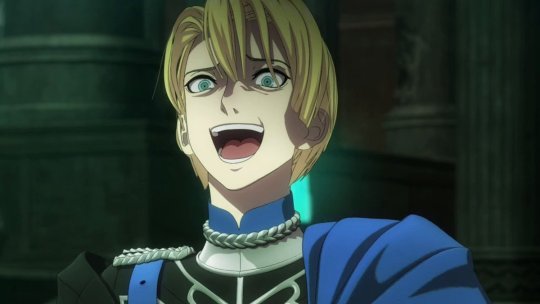
A major point I saw being made as proof of how terrible Dimitri is as a character was that he blamed Edelgard for the Tragedy of Duscur (a time where she would have been twelve). More accurately, he blamed her for everything that had happened and the thing is, I don’t disagree with that critique entirely. However, this is a case of him being a bad person, not a bad character. This might seem like an odd distinction, but I think it changes the scope of deserved criticism.
As I’ve been trying so desperately to illustrate, Dimitri snapping wasn’t just because of Edelgard being revealed as the Flame Emperor. Rather, it was an unlucky combination of many things. His grasp and interpretation of reality were already hazy at best by the time she was unmasked, slowly falling apart as his prodromal symptoms worsened. Going into the fight, he believed the Flame Emperor to be responsible in whole or in part for the worst thing that had ever happened to him, guessed at Arundel’s involvement, had found (and lied about) the dagger, and was rapidly mentally deteriorating. While Dimitri suspected Edelgard’s involvement to some degree, he did his best to act like it wasn’t true.
Dimitri didn’t want it to be true. To the extent that he was willing to lie to Byleth (and to himself) to avoid reality. He cared deeply about Edelgard. The best year of his life was spent with her, she was his first love, and she was the daughter of the step-mother he adored. Strong feelings beget strong feelings, do they not? This reveal confronted Dimitri with something that he could not accept, so his mind sidestepped the issue altogether. Delusion convinced him that all of the fears and worries he had beforehand were related, all into one larger delusion that Edelgard had sole responsibility. It’s not right and maybe not even excusable, but it falls in line with everything else.
Edelgard and Dimitri. Bound by some twisted fate but forever doomed to be separated, unable to understand the other’s chosen path.
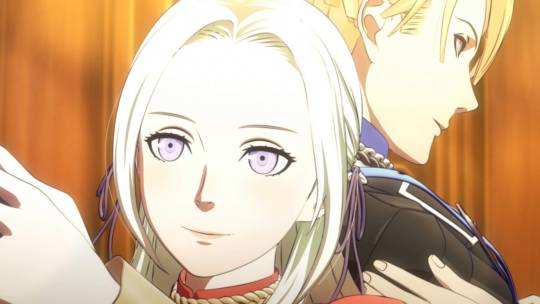
I do recognize the flaws of Dimitri’s character and arc. There are some pretty major flaws. I have parts of a post typed out about his shoddy recovery and how I’d fix it that, hopefully, one day will see the light of day as well as many complaints about the way the story is hindered by the need for flexibility to accommodate gameplay and a happy ending.
But, despite that, this has all been a very long-winded way of praising Dimitri’s writing. His mental illness has a surprising amount of depth and I loved studying it as intently as I did. I learned a lot about his character as well as about mental illness in general.
Ultimately, Dimitri is neither an innocent sweetheart whose actions are entirely excusable and justified or an unforgivable war criminal and overall terrible character. You can feel bad for his pain and his struggle with his illness and understand that as a reason for his actions, but you shouldn’t use it as justification. He had the opportunity to seek help before things got too bad. He was selfish with the mismanagement of his emotions and goals. However, he also was a victim. Dimitri worked to recover and mend the mistakes he made while he was unwell, which is a side of this mental illness that is rarely shown in media.
I wholeheartedly believe that, love him or hate him, Dimitri is the most well-written of the Three Houses characters,
#dimitri#fe dimitri#dimitri alexandre blaiddyd#fire emblem 16#fire emblem#FE3H#fire emblem three houses#i spent an ungodly amount of time on this feel free to share your thoughts
174 notes
·
View notes
Text
Unit 1
Definition, Dimensions, Social Ecological Model of Health and Health Literacy
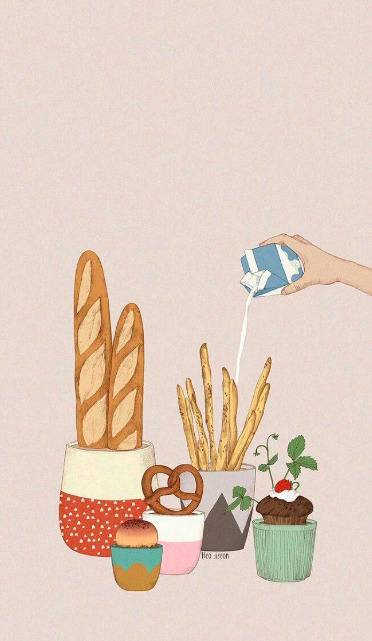
How much/what do you already know about this topic?What are you interested in learning about/initial questions.
It had been a number of months since I had taken a biology or sociology course. Going into this unit, I am confident in saying I do not know much about the topics at hand. I would like to learn about health literacy. I understand in this day and age of fake news and a society heavily based on the reliance of social media, that health literacy should be treated seriously.
Go through the lecture. For each item, take general notes. What facts seem important to know?
Definitions of Health:
For a long time, society went by the medical model, which stated "Health is being free of illness or injury." With the medical model, the health of a population is measured by vital statistics, particularly illness (morbidity) and death (mortality).
1946, the World Health Organization wrote a new definition into their Constitution. This is the definition currently acknowledged by the CDC. It has not been amended since 1948. "Health is a state of complete physical, mental and social well-being and not merely the absence of disease or infirmity."
While no organization has come forward yet to propose a formal, evolved definition of health, many agree that a new definition would need to include "being healthy includes balancing the multiple dimensions of health, and managing diseases successfully." By those standards, someone could be depressed, and still be "healthy".
My definition of being healthy: Feeling at the optimal and best level of wellness in all divisions of health and being capable of battling diseases.
-The ecological model is a model of health that emphasizes the linkages and relationships among multiple factors (or determinants) affecting health
Social/ Policy
Community
Institutional:
Interpersonal:
Individual:
-Use of models in public health
Organize thinking
Guide design of interventions
Evaluate effects of interventions
Health Literacy:
Now that everyday people have access to more information than ever before (thanks to media and the internet) and some people are more open to discussing their health among friends, or even in public forums, we have to be more thoughtful about the information that gets shared.
Unit 1 Review Guide Main Points
Difference between medical model and wellness models of health
The current 8 dimensions of health
The main levels of the Social Ecological Model. For example, you might be given factors that prevent people from exercising, and need to determine which level of influence they fit (individual, interpersonal, institutional, community, social/policy)
The principles of health literacy and determining quality health information. Why is it so easy for misinformation to spread?
What was the point of the videos? What are a few things I learned on the websites, and might the site be useful in the future? What questions do these resources bring up? If you were telling someone else about this class, what would you share from this unit.
The videos were great supplemental tools in illustrating the topics in a more audio and visual style learning mechanism. I have learned that "Health is a state of complete physical, mental and social well-being and not merely the absence of disease or infirmity”, being healthy includes balancing the multiple dimensions of health, and managing diseases successfully, and also that understanding that one's health comes down to how well they're doing in each of the dimensions. It's a collective, cumulative experience.
Dimensions of Health
8 Dimensions of Health: Emotional, financial, occupational, spiritual, physical, social, intellectual, environmental
youtube
Social Ecological Model of Health
youtube
As/after you engage in the Discussion: Can you summarize the question and the conclusions you and your classmates found? How do you feel about the issue now?
Discussion question:
List two health conditions and answer the questions that follow.
One that society is sympathetic toward
One that society has less sympathy for
Why do people view these conditions differently? Is it fair? How could we advocate for more compassion, or is the public shaming the best way to make people healthier?
Include links to back up your points (even if it's an example of bad information). Listing a condition in the "character flaw" category does not mean YOU personally believe it, but you think some people believe it.
Health Condition that society is sympathetic toward: Anxiety
Surpassing the acceptance and openness of anxiety as a health condition, there is still a population of society that overlooks the importance of this condition and does not find anxiety credible. I personally suffer from my own anxiety and I constantly hear remarks regarding anxiety “being in someone’s head” and a choice made by the person. This form of public shaming is not the best way to make people healthier. Most anxiety stems from traumatic experiences. The Mayo Clinic defines those that suffer from anxiety as “people [who] frequently have intense, excessive and persistent worry and fear about everyday situations… [often involving] repeated episodes of sudden feelings of intense anxiety and fear or terror that reach a peak within minutes (panic attacks)” (Mayo Clinic, 2018). The constant debilitating emotions and mental states, phobias, and internal meltdowns of anxiety disorders are very real and can be very mentally damaging and it’s important that as a society we continue to advocate for those who are fighting this disorder. Currently, I feel our society is doing a good job in recognizing victims- Soldiers that come back from deployment who suffer PTSD and women who come out of relationships of domestic violence are examples of victims who are given opportunities to seek and obtain help. Medical professionals and Medicinal dispensaries commonly treat anxiety disorders and it demonstrates that we as a community empathize with the condition. Anxiety disorder can even act like a gateway condition to other serious and damaging mental conditions that may hurt the overall wellness of the one suffering and affect those around them. It also knows no standard, anxiety can be experienced and damaging at any stage and condition of human life.
Health Condition that society has less sympathy for: Migraines
I do not believe the entirety of our society understands the validity of the health condition of migraines. There is a belief that people who suffer migraines are overly sensitive or are just experiencing headaches. Migraines are substantially different from headaches and just like anxiety can stem further serious health issues. According to Dr. Chris Iliades of Everyday Health Newsletters, “migraines are a neurological condition that is thought to occur when blood vessels in the brain expand, which releases chemicals that can cause inflammation and often excruciating pain. Nausea and vomiting commonly follow, as the nervous system responds to the pain” (Iliades, 2012). I believe the reason why society is less sympathetic towards this condition and do not shed appropriate light on the issue because there is not enough education being had about the condition. That, or there is misconceptions and misinformation being shared regarding the condition. Often times, migraines are frequently misdiagnosed as sinus headaches. Because there are currently frequent cases of misdiagnosis being had of migraines it’s reflective of the disconnection had regarding understanding those that suffer migraines and how it stems. To improve the disconnect, it’s important that our community is appropriately publicizing the condition and that there are outlets available for help for those that need it. Opportunities to self-assess and treat migraine conditions should be vast and taken seriously.
Cited Work:
Anxiety disorders. (2018, May 4). Retrieved March 18, 2020, from https://www.mayoclinic.org/diseases-conditions/anxiety/symptoms-causes/syc-20350961 (Links to an external site.)
IlIades, C. (2012, April 13). Migraine Misconceptions: Is There a Stigma? – Headache Migraine Center – Everyday Health. Retrieved March 18, 2020, from https://www.everydayhealth.com/headache-and-migraine/migraine-misconceptions.aspx
Peer engagement by Michelle Gifford:
“Gabriela, those are some good points! I didn't think of migraines as something that society doesn't have sympathy for migraines! I think society does think of migraines as something that people can control or did to themselves (too much stress, etc.) where some migraines are genetic or biological. I think society is more sympathetic towards us anxiety sufferers because we are talking about it more, there's more education about mental health and wellbeing and more technology in terms of mental health illness interventions (e.g. apps for meditation, telehealth medicine, etc). “ (Michelle Gifford)
My takeaway: Migraines are unfortunately a very serious condition that is not getting the appropriate amount of light shed on it. To improve the disconnect, it’s important that our community is appropriately publicizing the condition and that there are outlets available for help for those that need it. Migraines are substantially different from headaches and just like anxiety can stem further serious health issues.
After you complete the Homework: What did you learn? What do you want to know more about?
Assignment requires:
Complete the Wellness Self-Assessment. You do NOT have to turn this in, but you'll want to know the answers to help with the worksheet below.
Complete the Unit 1 Assignment worksheet and submit it here.
This assignment allowed myself to change my perspective on how healthy I view myself.
After you complete the Project: How was the experience? Any take-aways?
I have never heard of SMART goals prior to this project. What a great way to strategically plan how to achieve a goal. I believe the structure to the mechanism is well thought out. It hits every single facet that goes into the creation-process of creating personal goals. These strategies can easily be implemented into any lifestyle. As a stay-at-home mom, the implementation may be a little tricky but it is definitely possible.
General reflection on the unit--is there anything that feels important that you didn't mention above? If you had free time, what topics might you want to look into further?
If I had more free time, I would look into how else I may be able to implement the SMART goal structure. Will this fit well into other subjects?
0 notes